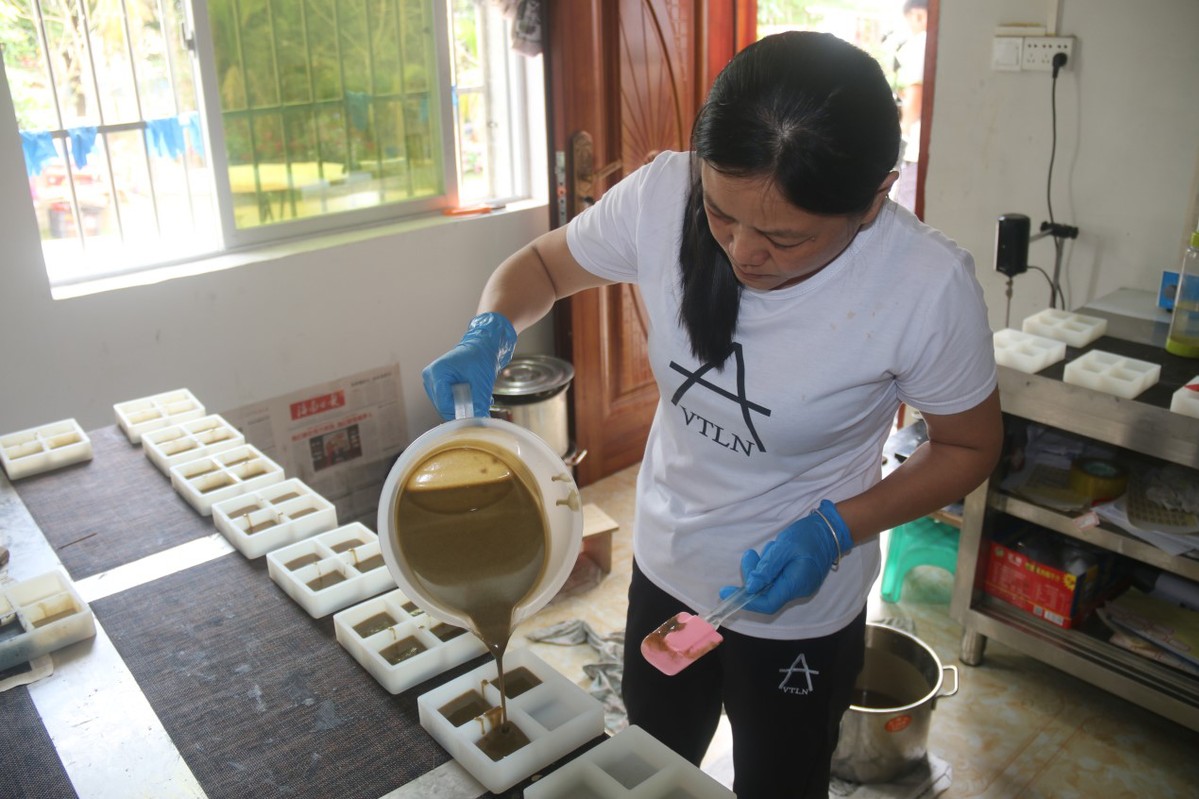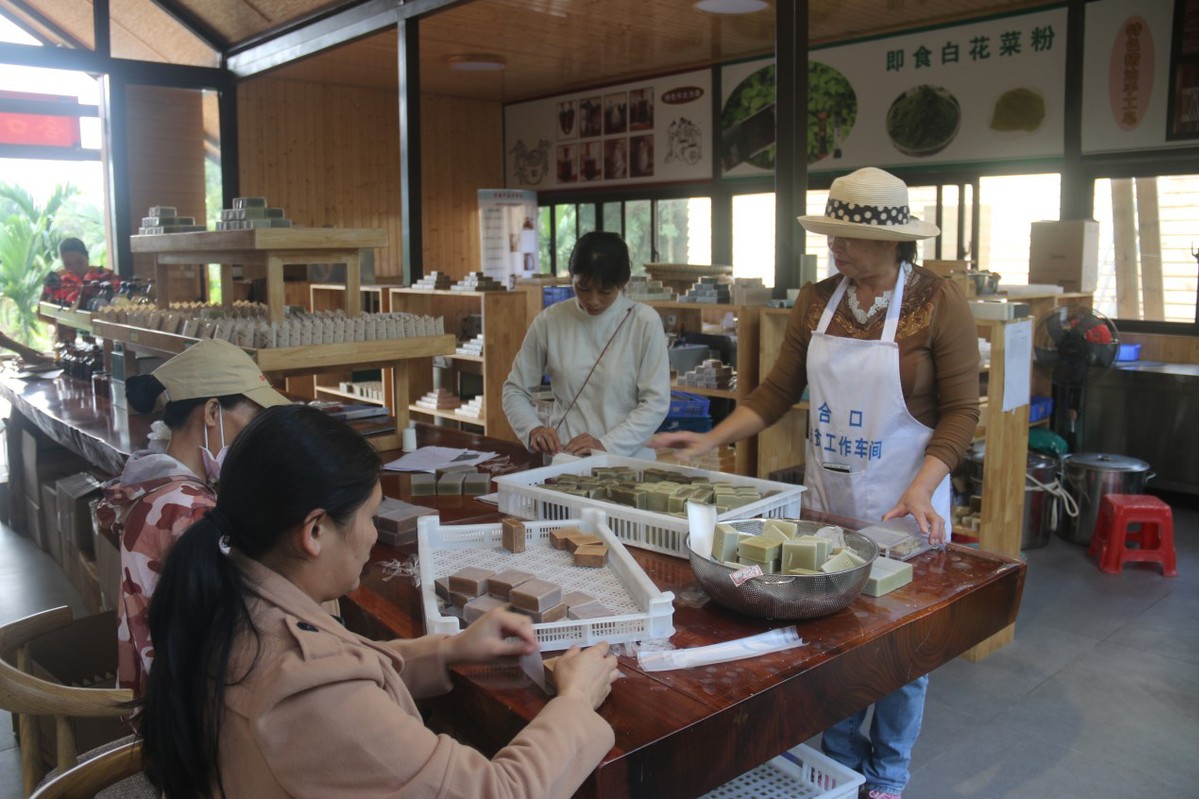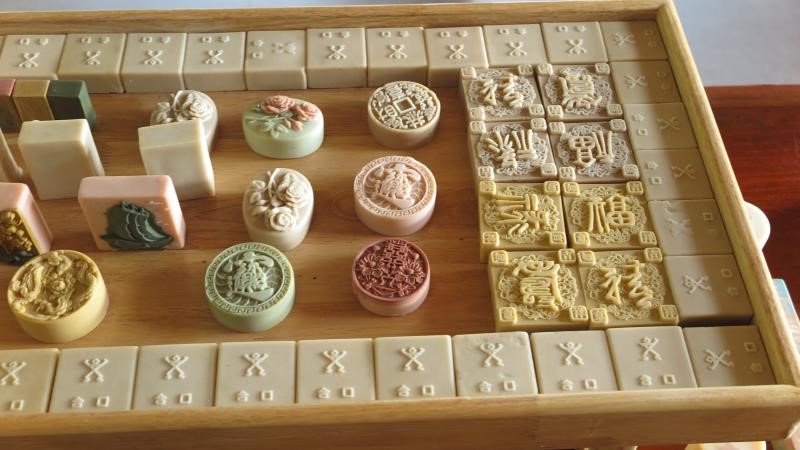
Ji Shuying, of the Chinese Li ethnic group, works at her family workshop. [Photo provided to China Daily.]
At their family workshop, surrounded by beautiful flowering plants and tall betel trees, middle-aged Ji Shuying skillfully stirs medicinal herbal mixtures —well-proportioned lard, wormwood, mint, lemon, rose and caulis spatholobi — and then pours the liquid into molds with traditional Chinese Li-style designs.
In about an hour, a dozen fragrant bars of soap are ready.
Ji, of the Chinese Li ethnic group in Baoting county, on the southern end of Hainan, China's island province, makes about 100 bars of soap per day, each weighing 100 grams. For the effort, she is paid 200 yuan ($29) by the rural cooperative of Zadong village, where she lives with her family.

Local villagers pack handmade soap at the cooperative. [Photo provided to China Daily]
Chen Xifeng, Ji's husband, helps do the packaging from time to time. They've earned about 5,000 yuan a month since early last year with the traditional Li-style soap, a figure the Chen family dared not dream of only a few years ago.
In response to the national plan to build beautiful villages and create more jobs for rural people, the Xiangshui town government, along with some farming households and the Hainan Hekou Agriculture Co, set up a cooperative early last year to make better use of local natural resources and traditional Li skills to support families that had recently escaped the poverty-stricken list, said Zhou Xianliang, director of the poverty alleviation office in Baoting.
"We provided free training to Ji and her village sisters," said Zhou Yan, general manager of the agriculture company. "Their handmade soaps are welcome in online shops."
Zhou said the cooperative will be supported in the cultivation of local flowers, medicinal herbs and tropical fruits, along with Li-style tourism products and services.
With an environment similar to that of Hawaii, picturesque Baoting covers 1,167 square kilometers. Lying at the golden latitude of 18-degrees north, it boasts world-class tropical ecological systems, lush primeval rain forests, serene valleys, waterfalls and springs, with forest coverage around 85 percent.
But for years, mountains, poor infrastructure and an economy based solely on agriculture held Baoting back. About 62 percent of its 167,800 people belong to the Li ethnic group — which traces its roots back 3,000 years. The Li were the first inhabitants of Hainan.
In 2002, Baoting was designated a national-level county for poverty alleviation and development, with 6,656 households officially registered as poverty-stricken in the national information database.
By 2019 standards, the household poverty line was 3,750 yuan in Hainan province, Zhou said.

Beautifully designed soap products handmade by villagers in Baoting. [Photos by Ma Zhiping/China Daily]
To lift Baoting's economic and social development, the Hainan provincial government and Baoting county accelerated a diversification of the local industrial make-up and made the growth of tourism and agriculture a priority, according to Jiang Liping, a member of the Standing Committee and publicity minister of the Baoting Li and Miao Autonomous County Committee of the Communist Party of China.
"By taking advantage of Baoting's unique tourism resources, including its tropical rainforests, the county government worked out a development path that highlights greenness, openness and sharing concepts for nearby villages," Jiang said.
She said the new mode closely integrates tourism with rural development.
Residents of Zajin village, less than 1 km from the Binlanggu 5A tourism zone, used to live in low, shabby, thatched houses with no running water or electricity. They made a living mainly by growing rice, areca, rubber and vegetables. In 2009, annual per capita net income was only 2,170 yuan.
Now all the 208 villagers have moved into Li-style villas built with supporting funds from the local government. Many villagers have found jobs in tourism-related services. Nearly half of their income is now earned in the tourism sector. In 2019, average per capita income in Zajin reached 16,500 yuan, according to the village committee.
"It's hard to find young people idling away their time all day long drinking, fighting or gambling in the villages as before," said Dong Yadao, an official with the village committee.
"Inclusive rural tourism development has created more business opportunities for villagers in those once poverty stricken rural communities."
He said local residents took a "wait-and-see" attitude toward village affairs before. But now people are very active and neighborhood relations are also in good harmony.

Beautifully designed soap products handmade by villagers in Baoting. [Photos by Ma Zhiping/China Daily]
"I used to rush about without earning money," said one resident, Chen Feng. "Now we can earn enough at home through engaging ourselves in the diversified business operations introduced by the poverty alleviation teams sent by the county government."
"My children now go to school free of tuition, and the government provides a living allowance every semester. Although I am 45 years old, I am studying horticulture at a local college as a part-time student," Chen said.
People like Chen increasingly found in villages around Baoting. They not only work hard with their businesses but are also enthusiastic about learning practical skills, broadening their vision and building their minds.
The training courses arranged by the county government, local companies and night schools have played a positive role in teaching practical skills for eco-friendly farming, marketing and management, and the upgrading of the farmers' vision and mindset as well, said Zhou of the local poverty alleviation office.
Gao Jun, a 44-year-old farmer from Qianjin village, earned little for years because of poor management of his fields and his refusal to exchange ideas with people around him. Now he is an expert on growing longan and pepper and is good at scientific growing and marketing of crops. Poverty-alleviation officials had successfully persuaded him to attend training courses and night school classes, and those made all the difference.
From 2016 to the end of last year, Baoting received 3.76 million tourists from home and abroad, bringing in 289 million yuan. More than 7,500 villagers from once poor families were engaged in the growing tourism business and earned additional income to improve their daily lives, said a report from the county government.
The report noted that from 2016 to 2018, Baoting injected a total of 66.6 million yuan as poverty reduction funds, which helped 6,587 households, or 25,951 local residents, to escape extreme poverty. To date, all its 44 poverty-stricken villages have left the poverty list.
Attracted by the changes in her hometown, Zajin village, 30-year-old Lin Wei quit her job at a travel agency in Sanya two years ago and started a homestay service offering an original Li-style experience — making Li food, dancing, playing Li musical instruments and growing and harvesting farm produce.
Lin is one of the young generation who have keenly realized the value and appeal of Li culture, with its characteristic rural leisure.
Cheng Tianfu, chairman of the Binlanggu Li & Miao Culture Tourism Zone, said: "In one poverty alleviation effort, we built a fruit market street in the zone, providing 130 stands free of charge to nearby villagers to sell fruit grown in their own fields. We also encouraged local farmers to grow flowers, plants and fruit trees and purchase them at a price higher than market price to beautify the tourist zone."
Cheng said as a step to help the poor and pass on the precious Li culture and skills, his company has invited a number of intangible Li cultural heritage inheritors and weaving craftsmen from Baoting and other areas of the island to demonstrate the traditional art of brocade weaving — "a living fossil" of Chinese weaving history — and pay them on a monthly basis.
Baoting Party Chief Wang Yuzheng said Baoting will build more tourism infrastructure, more ecological tourism projects and more beautiful villages and will promote integration of all industries and trade to help turn Baoting into an international tropical mountain tourism city, an international rain forest healthcare garden, a demonstration and experience base for the Li and Miao cultures and a special-feature tropical agriculture base.
A number of new eco-tourism projects are also unfolding a promising tomorrow — more jobs, growing income and a happier life — for villagers in Baoting.
They include a national tropical rain forest park that puts one-seventh of Hainan Island's land area under comprehensive ecological protection, and a new rainforest tourism zone, a combination of natural landscapes with multiple entertainment facilities, to be jointly built by a local company and US Discovery Communications with a total investment of 5 billion yuan.

